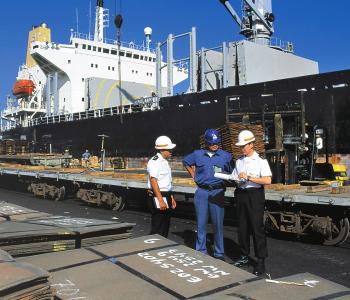Colombia

Colombia has a land area of approximately 2,070,408 km2, of which 55.15% corresponds to continental and insular land, and 44.85% to maritime territory. It is the only country in South America that has coasts on the Pacific Ocean and access to the Atlantic through the Caribbean Sea, which allows it to be located in a privileged position in geopolitical, geoeconomic and geoenvironmental terms, and to make use of the oceans as a strategic asset of the Nation in terms of research and economic growth, through its 15 maritime ports that mobilize more than 195 million average annual tons, as well as the good use of biodiversity and marine resources.
Colombia has 2,900 kilometers of coastline, in addition to the Archipelago of San Andrés, Providencia and Santa Catalina, with the Seaflower Biosphere Reserve, recognized by UNESCO. It also has fluvial and maritime borders with nine countries, including its proximity to the Panama Interoceanic Canal. This allows the country to have a connection with more than 7,000 maritime ports in the world, to have access to 60% of the shared oceanic spaces of the high seas, and to be an active part in the construction of scientific knowledge about Antarctica with 53 other countries.
The maritime port activity is in charge of the Maritime General Directorate (DIMAR).
MARITIME GENERAL DIRECTORATE
It is the Colombian Maritime Authority in charge of executing government policy in this area, with a structure that contributes to the strengthening of national maritime power, ensuring comprehensive maritime safety, the protection of human life at sea, the promotion of maritime activities and the scientific and technological development of the Nation.
MISSION
To exercise authority throughout the maritime territory, directing, coordinating and controlling maritime, river and coastal activities with comprehensive security and service vocation, with the aim of contributing to the development of the maritime and river interests of the Nation.
MARITIME CHRONICLES
MARITIME-PORT OPERATIONS IN NAVIGABLE CHANNELS OVER RIVERS IN COLOMBIA
The ports that operate in navigable channels on rivers, unlike the purely maritime ones, require actions that involve additional technological, human and physical resources due to the sequential al...
THE NEED TO INCORPORATE COMPREHENSIVE MARITIME SECURITY INTO STATE POLICIES
Undoubtedly the opportunity for foreign trade to materialize is thanks to maritime transport, port movement and international agreements that develop free trade, however, it is important to be awar
...DIGITIZATION OF PROCESSES IN LATIN AMERICA AND THE CARIBBEAN
Driven in part by government policy and in part by private sector investment as a partner in development, Latin American and Caribbean (LAC) ports have begun a process of modernization and digitiza
...

